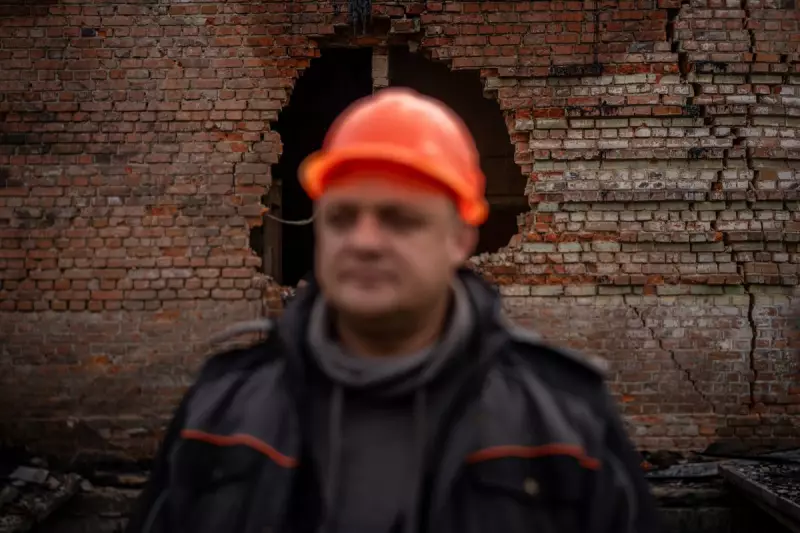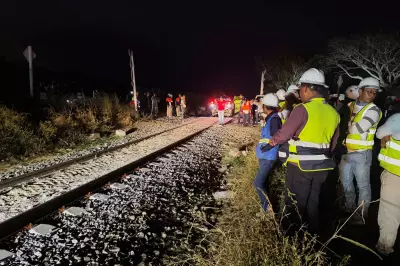
The Unseen Battle: Keeping Ukraine's Lights On
Almost four years into Russia's full-scale invasion, maintaining Ukraine's electricity supply has evolved into a separate conflict fought along a constantly shifting frontline. Energy workers across the nation routinely risk their lives to repair critical infrastructure that Russian forces deliberately target, creating a dangerous cycle of destruction and restoration.
Daily Risks and Sacrifices
Friends frequently ask power plant operator Mykhailo whether he seeks shelter during Russian bombardments of energy facilities. "If all the turbine operators hid during attacks, there'd be no energy left," he explained from his position in a thermal power plant's machine hall. "We have to stay at our posts. Who else would do the job?"
The human cost has been devastatingly high. Since the war began, at least 160 energy workers have been killed and more than 300 wounded. Mykhailo experienced this tragedy firsthand when his colleague Dmytro died just metres away from him during an attack. "I was simply luckier," Mykhailo said quietly, speaking on condition that his full identity be protected for security reasons.
The Associated Press had interviewed Dmytro in 2024 following an earlier strike on their plant. At that time, Dmytro vowed he would "work as long as I can." He died seven months later, becoming one of many energy workers deliberately targeted by Russian forces.
Restoring What Russia Destroys
In Chernihiv, 58-year-old Andrii Dzhuma has dedicated over three decades to maintaining power lines he originally helped construct when Ukraine remained part of the Soviet Union. Since the invasion began, he has repaired nearly 100 kilometres (65 miles) of damaged wiring - not for upgrades, but simply to restore what Russian attacks have shattered.
"Somehow, but we still give people light," Dzhuma stated, acknowledging that his essential work makes him a potential target. For many workers, this dangerous reality changes little in their daily routines. They continue reporting for duty despite the risks.
Twenty-four-year-old Bohdan Bilous, repairing power lines in the northern town of Shostka after heavy strikes caused blackouts, articulated the prevailing sentiment: "Better I become a target for Russia than civilians or soldiers." His shifts frequently extend beyond 12 hours, often conducted under the threatening buzz of enemy drones. "If one hits me, of course, it'll be sad for everyone. But I'll be glad it wasn't a child, or a residential building. In a way, it's a kind of self-sacrifice."
The danger persists even after workers leave their sites. On October 10, crane operator Anatoliy Savchenko, 47, was struck by a drone while driving home from a substation in Chernihiv region. When colleagues gathered to assist him, a second drone attack killed both Savchenko and worker Ruslan Deynega, 45. "Nobody thought that this would happen," said Liudmyla Savchenko, Anatoliy's widow. "Especially since they were already returning home."
A Mission Beyond Employment
For Oleksandr Tomchuk, a repair and maintenance supervisor for substations near Kyiv, his work has transformed into a vital mission. "The main thing is that our soldiers hold the front so the Russians don't come here," Tomchuk said. "We'll do everything to make sure people don't freeze this winter."
When called during night-time attacks, he assembles his team within thirty minutes to rush to drone-damaged substations. Tomchuk, who survived Russian occupation of his village early in the war, compares their urgency to rescue services. "Their heat, comfort and quality of life depend on us," he emphasized.
Western-supplied electrical equipment proves crucial for these repairs. "They give us the resources to keep repairing. We'll keep restoring and restoring, no matter if we fixed it yesterday and it's hit again today. That's our fate, our mission," Tomchuk declared.
Sitting at home after another demanding day, with his three children playing around him, Tomchuk insisted "There's no such thing as tiredness." His wife Olena interjected laughingly, "What tiredness? He has three kids! He rests at work." Despite their humour, both understand the very real dangers Tomchuk faces daily.
The psychological toll weighs heavily on workers. Mykhailo acknowledged that fear affects morale, though most conceal their anxiety through humour and mutual support. Returning to work after Dmytro's death proved particularly challenging.
"No one chained me here. I could leave anytime," Mykhailo reflected. "But if I quit, I lose my specialty - and most likely, I'd have to go to the front line." He sees no favourable alternatives. "It's scary and hard mentally. You go to work knowing that maybe you can be killed... and you just do it through effort and willpower."
Dmytro's widow Tetiana remembered her husband as "reliable, loving, kind and bright" and said he understood his job's risks perfectly. "I often saw fear in his eyes when he went to work," she recalled. On his final day, he noted that Russian missiles had entered Ukrainian airspace before leaving home.
Tetiana offered a poignant summary of the energy workers' indispensable role: "Light doesn't come from machines. It comes from people who risk their lives to bring it. If they stop going to work, there will be no gas, no heat, no light."
This reality continues as energy workers operate amidst an unfolding corruption scandal involving top officials at Ukraine's state-owned nuclear power company, adding institutional challenges to their already perilous physical circumstances.





